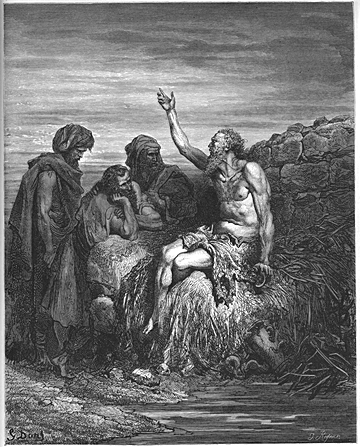أيُّوب 2
| ثُمَّ مَثَلَ بَنُو اللهِ مَرَّةً أُخْرَى فِي حَضْرَةِ الرَّبِّ، وَانْدَسَّ الشَّيْطَانُ أَيْضاً فِي وَسَطِهِمْ، | ١ 1 |
Forsothe it was doon, whanne in sum dai the sones of God `weren comun, and stoden bifor the Lord, and Sathan `was comun among hem, and stood in his siyt,
| فَسَأَلَ الرَّبُّ الشَّيْطَانَ: «مِنْ أَيْنَ جِئْتَ؟» فَأَجَابَ الشَّيْطَانُ: «مِنَ الطَّوَافِ فِي الأَرْضِ وَالتَّجَوُّلِ فِيهَا». | ٢ 2 |
that the Lord seide to Sathan, Fro whennus comest thou? Which answeride, and seide, Y haue cumpassid the erthe, `and Y haue go thury it.
| فَقَالَ الرَّبُّ لِلشَّيْطَانِ: «هَلْ رَاقَبْتَ عَبْدِي أَيُّوبَ فَإِنَّهُ لَا نَظِيرَ لَهُ فِي الأَرْضِ، فَهُوَ رَجُلٌ كَامِلٌ صَالِحٌ، يَتَّقِي اللهَ وَيَحِيدُ عَنِ الشَّرِّ، وَحَتَّى الآنَ لَا يَزَالُ مُعْتَصِماً بِكَمَالِهِ، مَعَ أَنَّكَ أَثَرْتَنِي عَلَيْهِ لأُهْلِكَهُ مِنْ غَيْرِ دَاعٍ». | ٣ 3 |
And the Lord seide to Sathan, Whethir thou hast biholde my seruaunt Joob, that noon in erthe is lijk hym; he is a symple man, and riytful, and dredynge God, and goynge awei fro yuel, and yit holdynge innocence? `But thou hast moued me ayens him, that `Y schulde turmente hym in veyn.
| فَأَجَابَ الشَّيْطَانُ: «جِلْدٌ بِجِلْدٍ، فَالإِنْسَانُ يَبْذُلُ كُلَّ مَا يَمْلِكُ فِدَاءَ نَفْسِهِ. | ٤ 4 |
To whom Sathan answeride, and seide, `A man schal yyue skyn for skyn, and alle thingis that he hath for his lijf;
| وَلَكِنْ حَالَمَا تَمُدُّ يَدَكَ إِلَيْهِ وَتَمَسُّ عَظْمَهُ وَلَحْمَهُ فَإِنَّهُ فِي وَجْهِكَ يُجَدِّفُ عَلَيْكَ». | ٥ 5 |
`ellis sende thin hond, and touche his boon and fleisch, and thanne thou schalt se, that he schal curse thee in the face.
| فَقَالَ الرَّبُّ لِلشَّيْطَانِ: «هَا أَنَا أُسَلِّمُهُ إِلَيْكَ، وَلَكِنِ احْفَظْ نَفْسَهُ». | ٦ 6 |
Therfor the Lord seide to Sathan, Lo! he is in `thin hond; netheles kepe thou his lijf.
| فَانْصَرَفَ الشَّيْطَانُ مِنْ حَضْرَةِ الرَّبِّ، وَابْتَلَى أَيُّوبَ بِقُرُوحٍ انْتَشَرَتْ فِي بَدَنِهِ كُلِّهِ، مِنْ قِمَّةِ الرَّأْسِ إِلَى أَخْمَصِ الْقَدَمِ، | ٧ 7 |
Therfor Sathan yede out fro the face of the Lord, and smoot Joob with `a ful wickid botche fro the sole of the foot `til to his top;
| فَجَلَسَ أَيُّوبُ وَسَطَ الرَّمَادِ وَتَنَاوَلَ شَقْفَةً يَحُكُّ بِها قُرُوحَهُ. | ٨ 8 |
which Joob schauyde the quytere with a schelle, `and sat in the dunghil.
| فَقَالَتْ لَهُ زَوْجَتُهُ: «أَمَازِلْتَ مُعْتَصِماً بِكَمَالِكَ؟ جَدِّفْ عَلَى اللهِ وَمُتْ». | ٩ 9 |
Forsothe his wijf seide to hym, Dwellist thou yit in thi symplenesse? Curse thou God, and die.
| فَأَجَابَهَا: «أَنْتِ تَتَكَلَّمِينَ كَالْجَاهِلاتِ! أَنَقْبَلُ الْخَيْرَ مِنْ عِنْدِ اللهِ وَالشَّرَّ لَا نَقْبَلُ؟». فِي هَذَا كُلِّهِ لَمْ تَرْتَكِبْ شَفَتَا أَيُّوبَ خَطَأً فِي حَقِّ اللهِ. | ١٠ 10 |
And Joob seide, Thou hast spoke as oon of the fonned wymmen; if we han take goodis of the hond of the Lord, whi forsothe suffren we not yuels? In alle these thingis Joob synnede not in hise lippis.
| وَعِنْدَمَا سَمِعَ أَصْحَابُ أَيُّوبَ الثَّلاثَةُ بِمَا حَاقَ بِهِ مِنْ شَرٍّ، تَوَافَدُوا إِلَيْهِ مِنْ مَقَرِّ إِقَامَتِهِمْ، وَهُمْ أَلِيفَازُ التَّيْمَانِيُّ، وَبِلْدَدُ الشُّوحِيُّ، وَصُوفَرُ النَّعْمَاتِيُّ، بَعْدَ أَنْ تَوَاعَدُوا عَلَى الاجْتِمَاعِ عِنْدَهُ لِلرِّثَاءِ لَهُ وَلِتَعْزِيَتِهِ. | ١١ 11 |
Therfor thre frendis of Joob herden al the yuel, that hadde bifelde to hym, and camen ech man fro his place, Eliphath Temanytes, and Baldach Suythes, and Sophar Naamathites; for thei `hadden seide togidere to hem silf, that thei wolden come togidere, and visite hym, and coumforte.
| وَإِذْ رَأَوْهُ مِنْ بَعِيدٍ لَمْ يَعْرِفُوهُ لِفَرْطِ مَا حَلَّ بِهِ، فَرَفَعُوا أَصْوَاتَهُمْ بِالْبُكَاءِ، وَمَزَّقَ كُلُّ وَاحِدٍ جُبَّتَهُ وَذَرَّوْا تُرَاباً فَوْقَ رُؤُوسِهِمْ نَحْوَ السَّمَاءِ، | ١٢ 12 |
And whanne thei hadden reisid afer `her iyen, thei knewen not hym; and thei crieden, and wepten, and to-renten her clothis, and spreynten dust on her heed `in to heuene.
| وَمَكَثُوا جَالِسِينَ مَعَهُ عَلَى الأَرْضِ سَبْعَةَ أَيَّامٍ وَسَبْعَ لَيَالٍ، لَمْ يُكَلِّمْهُ فِيهَا أَحَدٌ مِنْهُمْ بِكَلِمَةٍ لِشِدَّةِ مَا كَانَ عَلَيْهِ مِنْ كَآبَةٍ. | ١٣ 13 |
And thei saten with hym in the erthe seuene daies and seuene nyytis, and no man spak a word to hym; for thei sien, that his sorewe was greet.





















